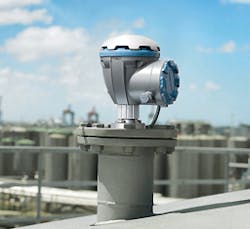The U.S. Federal Communications Commission (FCC) has adopted rules geared specifically to level probing radars (LPRs) that allow these devices to operate anywhere in the country without a license.
The Industry Association representing manufacturers of LPRs, the Measurement, Control & Automation Association (MCAA) worked closely with the FCC throughout the regulatory process, providing information to the technical office within the FCC which crafted a Notice of Proposed Rulemaking in 2012.
The FCC action amends the existing rules to account for LPR special technical characteristics that posed previous obstacles to FCC approval. MCAA supplied critical information to the FCC for their use in preparing the new rules.
Specifically, the order modifies Part 15 of the FCC Rules for level probing radars to operate on an unlicensed basis in the 5.925-?7.250 GHz, 24.05-?29.00 GHz and 75-?85 GHZ bands and revises the measurement procedures to provide more accurate and repeatable measurement protocols for these devices. The FCC indicated that “The amended rules adopted in this Report and Order would establish a comprehensive and consistent approach that would provide simplicity and predictability for authorizing LPRs for level -? measuring applications in any type of tank or open -? air environments.”
RELATED: Maintain level instrument safety; understand the associated costs
The rules now require measuring emissions in the main beam of the LPR antenna and adjust the emission limits to account for the significant attenuation that occurs upon reflection of those emissions. The new limits will still protect any nearby receivers from encountering interfering signal levels. Significantly, the new rules partially harmonize the US technical rules for LPR devices with similar European standards which improves the competitiveness of U.S. manufacturers in the global economy — a point which MCAA repeatedly made in its communications with FCC officials. In its Report and Order, the FCC notes New Section 15.256 will allow for the introduction of more diverse applications of LPR in several frequency bands and improve the accuracy and reliability of these level-?measuring tools beyond what is achievable under Section 15.209.
The new rules will also help to streamline equipment development and certification of LPR devices, allowing manufacturers to take advantage of economies of scale by marketing the same LPR device for a variety of RF level?measuring applications, as well as provide a simplified method for measuring the radiated emissions from these devices. The FCC Order also mentions one of MCAA’s specific requests that the FCC continue to provide an option to certify LPRs under the much lower but generally more flexible general emission limits of Section 15.209. MCAA asked that LPRs be allowed to operate in any frequency range that does not contain a restricted band as permitted by Section 15.209 and the FCC has agreed to continue that, since some LPRs need bandwidths wider than the new rules permit to achieve precision measurements. In changing the technical testing requirements, the FCC Rules will now harmonize with the European Telecommunications Standards Institute (ETSI) Technical Standard for LPR devices wherein measurements are based on main -? beam emission limits, another critical change that MCAA supported to the FCC.
